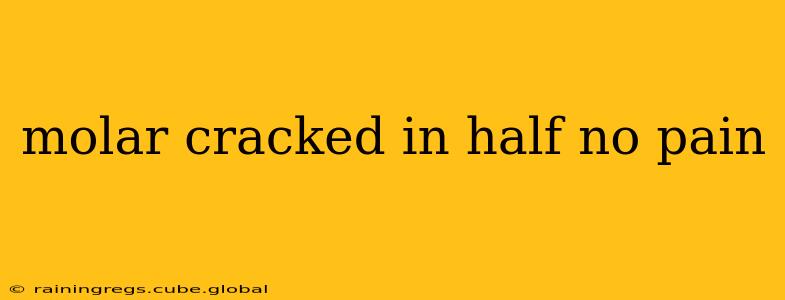A cracked molar, even without pain, is a serious dental issue that requires immediate attention. While the absence of pain might seem reassuring, it often masks a potentially worsening problem that could lead to significant complications down the line. This comprehensive guide explores the reasons why a cracked molar without pain is still a cause for concern, and what steps you should take.
Why No Pain?
Many people wonder, "Why isn't my cracked tooth hurting?" The lack of pain doesn't mean the crack isn't there; it simply means the crack hasn't reached the tooth's nerve (the pulp). The crack may be superficial, affecting only the outer enamel and dentin layers. However, even minor cracks can worsen over time, potentially exposing the pulp to bacteria and leading to severe pain, infection (abscess), and even tooth loss. The crack may also be in a location that doesn't put pressure on the nerve.
What are the Different Types of Cracked Teeth?
Understanding the different types of cracked teeth is crucial. There are several classifications, including:
- Fractured cusp: A relatively small chip or crack in the cusp (the pointed top of a molar). This often causes minimal or no pain initially.
- Cracked tooth: A crack that extends from the chewing surface down towards the root. The extent and location of the crack determine the level of pain experienced.
- Split tooth: A crack that completely splits the tooth into two or more pieces. This often results in pain, but not always initially.
- Vertical root fracture: A crack that extends from the root into the crown, often causing no pain until the crack progresses. These fractures are particularly dangerous because they often necessitate extraction.
How Can I Tell if My Molar is Cracked?
Diagnosing a cracked molar can be tricky, even for dentists. While a lack of pain is common, certain signs might indicate a problem:
- Sensitivity to temperature: While not always present, some individuals experience sensitivity to hot or cold.
- Sharp pain when biting down: This pain might only occur when biting on a specific part of the tooth.
- Persistent dull ache: Even though you might not have acute pain, a persistent dull ache can signal a problem.
- Visible crack: Sometimes, you might actually see the crack in your tooth, especially if it's close to the gum line.
- Clicking sound or feeling: Sometimes you may feel or hear a clicking sensation when chewing.
What Happens If I Ignore a Cracked Molar?
Ignoring a cracked molar, regardless of pain, is risky. Here's why:
- Infection: Bacteria can easily penetrate the crack, leading to an infection (abscess) that may require root canal treatment or extraction.
- Tooth Loss: If the crack continues to worsen, the tooth may eventually break completely, requiring extraction.
- Spread of Infection: An untreated infection can spread to surrounding teeth, gums, and even bone, causing significant damage.
How is a Cracked Molar Diagnosed?
Your dentist will conduct a thorough examination, which may include:
- Visual inspection: A close examination of your tooth to look for any visible cracks.
- Bite test: Checking for pain or sensitivity when biting down on different parts of your tooth.
- X-rays: X-rays provide a more detailed view of the tooth's structure, revealing any internal cracks or root fractures.
- Transillumination: Shining a light through the tooth to detect hidden cracks.
What are the Treatment Options for a Cracked Molar?
Treatment options depend on the severity and location of the crack:
- Dental bonding: For minor cracks, your dentist might repair the crack using bonding material.
- Crown: For more extensive cracks, a crown (cap) may be placed over the tooth to protect it.
- Root canal: If the crack reaches the pulp, a root canal may be necessary to remove the infected pulp and save the tooth.
- Extraction: In cases of severe cracks, particularly vertical root fractures, extraction might be the only option.
Can a cracked molar heal on its own?
No, a cracked molar will not heal on its own. The tooth's structure is compromised, and the crack will likely worsen without intervention.
What should I do if I think my molar is cracked?
Schedule an appointment with your dentist as soon as possible. Early detection and treatment are crucial to preserving your tooth and preventing more serious complications. Don't delay—your oral health depends on it!
This information is for educational purposes only and should not be considered medical advice. Always consult with a qualified dentist for diagnosis and treatment of dental problems.
